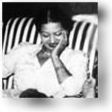|
"My father was uneasy. The idea that his daughter should sing in
front of men he didn't know, was difficult for him to accept, but my
singing helped support the family. So he dressed me in boy's clothes,
and I sang this way for several years. I realize now that he wanted
to convince himself, and the audience too, that the singer was a
young boy, and not a young woman."
|
|
She had the musicality of Ella Fitzgerald, the public presence of
Eleanor Roosevelt, and the audience of Elvis Presley. Her name was Umm
Kulthum, and she became a powerful symbol, first of the aspirations of
her country, Egypt, and then of the entire Arab world.
Born a peasant at the turn of the century, she became a woman of great
wealth and power, confidant of presidents and kings, and above all,
President Gamal Abd al-Nasser's unofficial ambassador in the region.
Four million people were on the streets of Cairo for her funeral in 1975.
To this day, her cassettes outsell every other Arabic female vocalist.
Narrated by Omar Sharif, Umm Kulthum, A Voice Like Egypt is
the first documentary to bring Umm Kulthum to an American audience.
The film puts her life in the context of the epic story of 20th
century Egypt as it shook off colonialism and confronted modernity.
The camera explores her astonishing connection with her audience,
taking us into her village in the Nile Delta, and into the cafes,
markets, and streets of Cairo where she lived and worked. From the
Nobel laureate Naguib Mahfouz to a 12-year-old girl in an outdoor
restaurant, people speak about the role Umm Kulthum's music has played
in their lives, and sing their favorite songs for the camera.
Producer/Director Michal Goldman lived in Cairo for more than two
years, researching and filming with an Egyptian crew. Umm Kulthum,
A Voice Like Egypt has been funded principally by grants from the
National Endowment for the Humanities and The Ford Foundation. The
film is based on the book "The Voice of Egypt": Umm Kulthum, Arabic
Song, and Egyptian Society in the Twentieth Century, by Virginia
Danielson.
"When she sang, she was never the heroine. People heard their own
story in her songs."
|





